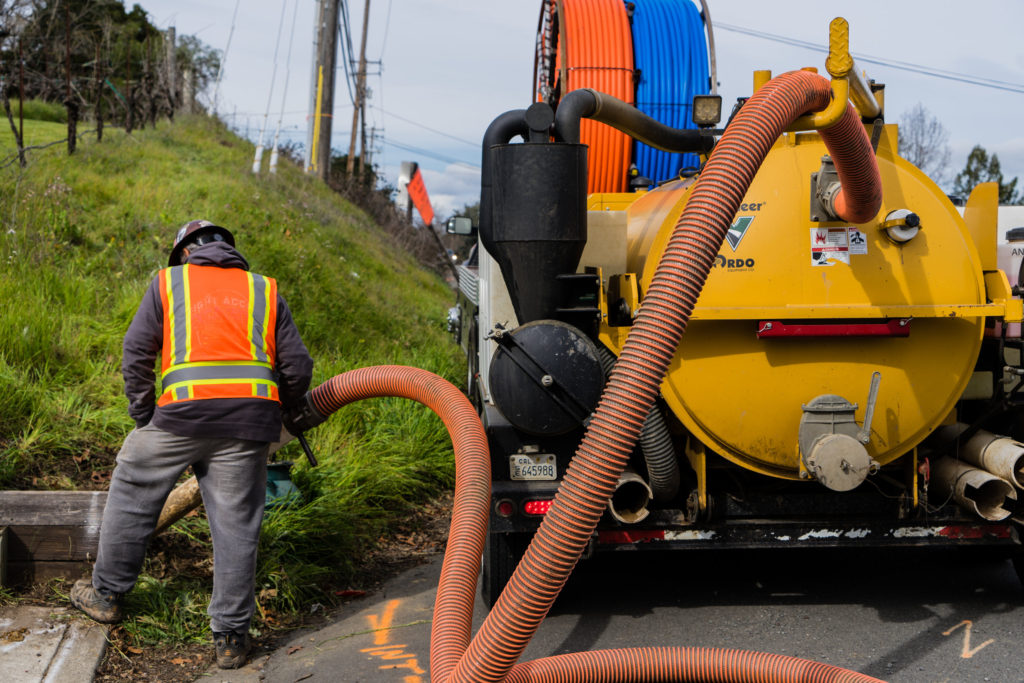Tight access excavation in Melbourne refers to a type of excavation performed in areas with limited space or restricted access. This may include narrow alleys, small backyards, or tight construction sites where conventional excavation equipment cannot fit or manoeuvre.
To perform tight access excavation, specialised equipment and techniques allow the excavation to be carried out safely and efficiently in a confined space. This may include mini excavators, bobcats, or other compact equipment that can fit through narrow openings and tight spaces.
Tight access excavation is commonly used in urban areas where space is limited, and existing buildings or other structures often surround construction projects. It is also used in residential landscaping projects where space is limited, such as when installing a small pool or patio in a backyard with limited access.
The Process
Tight access excavation involves a specific process designed to safely and efficiently excavate an area with limited space or restricted access. Following is a detailed breakdown of the process –
- Site assessment: The first step in tight access excavation is to assess the site and determine the best approach. This may involve measuring the available space, assessing the soil conditions, and identifying any potential obstacles or hazards.
- Equipment selection: Once the site has been assessed, the appropriate equipment for the job is selected. This may include mini excavators, bobcats, or other compact equipment that can fit through narrow openings and tight spaces.
- Safety measures: Before beginning the excavation, safety measures are implemented to protect workers and minimise the risk of damage to existing structures or utilities. This may include installing safety barriers, marking utility lines, and ensuring workers wear appropriate safety gear.
- Excavation: The excavation work can begin once the safety measures are in place. The excavation equipment operator carefully navigates through the limited space or restricted access to reach the excavation site. The excavation uses the selected equipment and specialised techniques that allow for precise and efficient digging.
- Removal of excavated material: As the excavation progresses, the excavated material removed from the site and disposed of in accordance with local regulations.
- Site cleanup: Once the excavation is complete, the site cleaned up, and any debris or leftover material removed. The area then inspected to ensure that the excavation has carried out safely and without causing damage to existing structures or utilities.
Tight access excavation in Melbourne also requires a high level of skill and expertise, as the excavation must carried out safely and without causing damage to existing structures or utilities. Hiring a qualified and experienced excavation contractor specialising in tight access excavation important to ensure the work done correctly.
The Advantages
Tight access excavation has several advantages over traditional excavation methods when working in confined spaces or areas with limited access. Following are some of the key advantages of tight access excavation:
- Access to tight spaces: Tight access excavation specifically designed to access areas that are too small or narrow for traditional excavation equipment. This allows excavation work to performed in areas that would otherwise be inaccessible.
- Efficient excavation: Tight access excavation can completed quickly and efficiently using specialised equipment and techniques. This saves time and money compared to traditional excavation methods, which may require more labour and time-consuming manual work.
- Minimal disruption: Tight access excavation is generally less disruptive to the surrounding area than traditional excavation methods. This is because the equipment used is smaller and less likely to damage existing structures or utilities.
- Greater precision: Tight access excavation can carried out more precisely than traditional excavation methods. This allows for more accurate excavation work and ensures the job done correctly the first time.
- Improved safety: Tight access excavation is generally safer than traditional excavation methods, as the equipment is smaller and more manoeuvrable. The risk of accidents, injuries, and damage to existing structures or utilities reduced.
Tight access excavation in Melbourne is a specialised technique that offers several advantages when working in confined spaces or areas with limited access. One of the main advantages of tight access excavation is that it can save time and money compared to traditional excavation methods. Excavation work can completed quickly, efficiently, and safely, with minimal disruption to the surrounding area using specialised equipment and techniques.
The Disadvantages
While tight access excavation has several advantages, there are also some potential disadvantages. Here are some of the key disadvantages of tight access excavation –
- Limited space: One of the biggest disadvantages of tight access excavation is the limited space available. This can make it difficult to manoeuvre the equipment and may limit the size of the excavation that can performed.
- Increased difficulty: Tight access excavation requires a high level of skill and expertise, as well as specialised equipment and techniques. This can increase the difficulty and complexity of the excavation work.
- Increased cost: Tight access excavation may more expensive than traditional excavation methods, as specialised equipment and techniques required. This can make it less cost-effective for larger excavation projects.
- Increased risk: While tight access excavation can be safer than traditional excavation methods, there is still an increased risk of accidents and injuries due to the limited space and potential hazards in the excavation site.
- Limited equipment options: The equipment options for tight access excavation may limited, making it difficult to find the right equipment for the job. This may require more time and effort to find the right equipment, which can add to the project’s overall cost.
Tight access excavation in Melbourne offers several advantages in certain situations, but there are also some potential disadvantages. It is important to carefully assess the site and consider all the options before deciding on the best approach for an excavation project.
In a Nutshell
Researching and selecting a reputable and experienced company that licensed and insured is essential. Read the reviews and ask for references from previous clients to ensure they have a history of providing quality work and completing projects on time and within budget.
P S Concrete Removal helps to discuss your specific excavation needs with their experts. We have the appropriate equipment and expertise to complete the job safely and effectively. With our personnel, tight access excavation projects can completed with minimal disruption and maximum efficiency.




